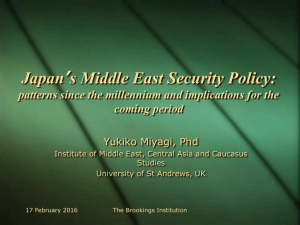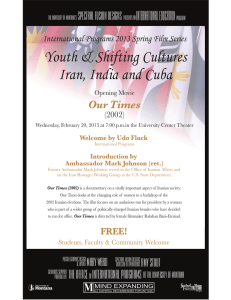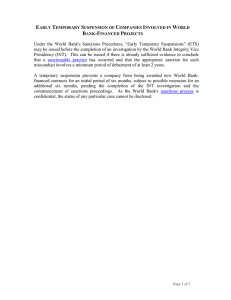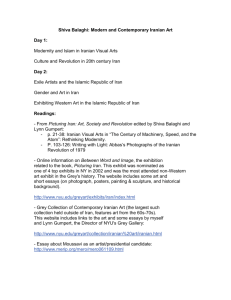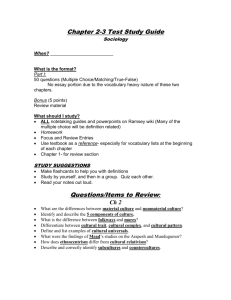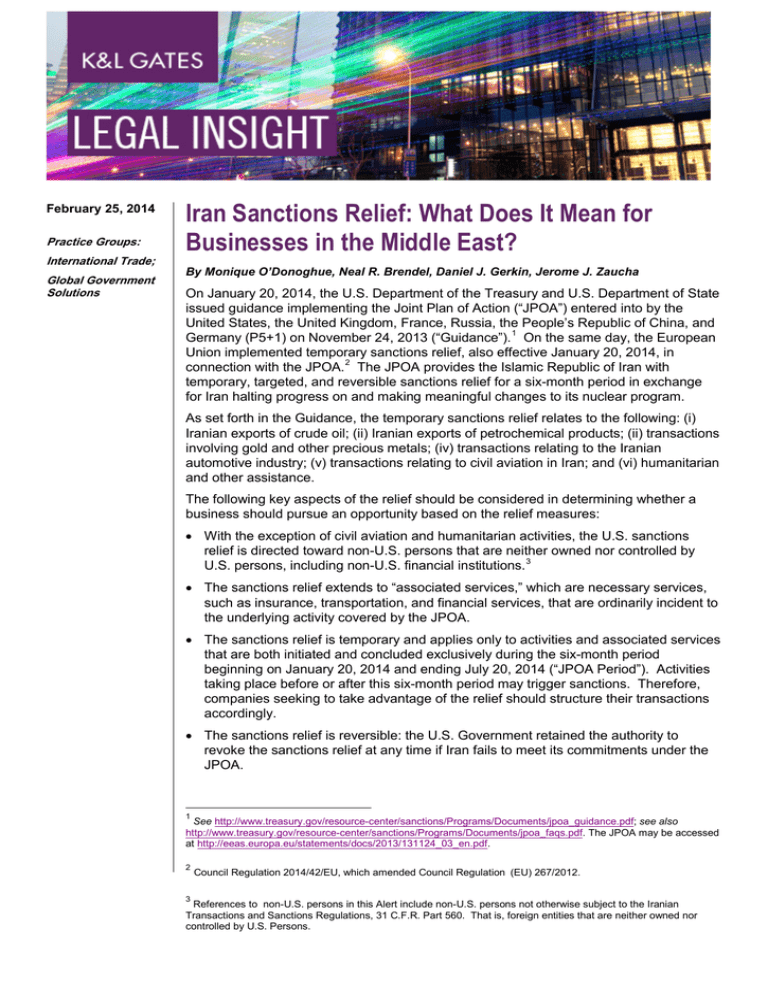
February 25, 2014
Practice Groups:
International Trade;
Global Government
Solutions
Iran Sanctions Relief: What Does It Mean for
Businesses in the Middle East?
By Monique O’Donoghue, Neal R. Brendel, Daniel J. Gerkin, Jerome J. Zaucha
On January 20, 2014, the U.S. Department of the Treasury and U.S. Department of State
issued guidance implementing the Joint Plan of Action (“JPOA”) entered into by the
United States, the United Kingdom, France, Russia, the People’s Republic of China, and
Germany (P5+1) on November 24, 2013 (“Guidance”). 1 On the same day, the European
Union implemented temporary sanctions relief, also effective January 20, 2014, in
connection with the JPOA. 2 The JPOA provides the Islamic Republic of Iran with
temporary, targeted, and reversible sanctions relief for a six-month period in exchange
for Iran halting progress on and making meaningful changes to its nuclear program.
As set forth in the Guidance, the temporary sanctions relief relates to the following: (i)
Iranian exports of crude oil; (ii) Iranian exports of petrochemical products; (ii) transactions
involving gold and other precious metals; (iv) transactions relating to the Iranian
automotive industry; (v) transactions relating to civil aviation in Iran; and (vi) humanitarian
and other assistance.
The following key aspects of the relief should be considered in determining whether a
business should pursue an opportunity based on the relief measures:
• With the exception of civil aviation and humanitarian activities, the U.S. sanctions
relief is directed toward non-U.S. persons that are neither owned nor controlled by
U.S. persons, including non-U.S. financial institutions. 3
• The sanctions relief extends to “associated services,” which are necessary services,
such as insurance, transportation, and financial services, that are ordinarily incident to
the underlying activity covered by the JPOA.
• The sanctions relief is temporary and applies only to activities and associated services
that are both initiated and concluded exclusively during the six-month period
beginning on January 20, 2014 and ending July 20, 2014 (“JPOA Period”). Activities
taking place before or after this six-month period may trigger sanctions. Therefore,
companies seeking to take advantage of the relief should structure their transactions
accordingly.
• The sanctions relief is reversible: the U.S. Government retained the authority to
revoke the sanctions relief at any time if Iran fails to meet its commitments under the
JPOA.
1
See http://www.treasury.gov/resource-center/sanctions/Programs/Documents/jpoa_guidance.pdf; see also
http://www.treasury.gov/resource-center/sanctions/Programs/Documents/jpoa_faqs.pdf. The JPOA may be accessed
at http://eeas.europa.eu/statements/docs/2013/131124_03_en.pdf.
2
3
Council Regulation 2014/42/EU, which amended Council Regulation (EU) 267/2012.
References to non-U.S. persons in this Alert include non-U.S. persons not otherwise subject to the Iranian
Transactions and Sanctions Regulations, 31 C.F.R. Part 560. That is, foreign entities that are neither owned nor
controlled by U.S. Persons.
Iran Sanctions Relief: What Does It Mean for Businesses in the Middle
East?
• The broader sanctions architecture restricting business with Iran and prohibiting
investments in Iran remains in place. Similarly, with the exception of the companies
specifically listed in the Guidance, the prohibition on transactions with individuals or
entities on the Treasury Department’s list of Specially Designated Nationals and
Blocked Persons (“SDN List”) also remains in place.
Given the limited scope and duration of the sanctions relief, the substantial complexity of
the sanctions regime that remains in place, and the uncertainty regarding the prospects
for a long-term agreement, it is advisable for anyone seeking to pursue potential new
business opportunities based on the recent U.S. Guidance to exercise caution. During
his recent visit to the United Arab Emirates, Under Secretary for Terrorism and Financial
Intelligence David S. Cohen cautioned business to be careful in pursuing opportunities
with Iran because of the very narrow economic activity that is allowed under the
sanctions relief and the extensive and complicated sanctions that remain in place.
Accordingly, those considering new business opportunities in Iran or with Iranian entities
should take a slow and measured approach and ensure they are complying with the
applicable U.S. and E.U. restrictions.
Iranian Exports of Petroleum and Petroleum Products.
The JPOA provides for sanctions relief related to Iran’s sales of crude oil. Under the
JPOA, Iran will be permitted to maintain its current average level of exports of petroleum
and petroleum products to China, India, Japan, the Republic of Korea, Taiwan, and
Turkey (approximately 100 million barrels per day). The JPOA, however, does not allow
for an increase in the level of exports to these six countries, nor does it allow for the
export of petroleum or petroleum products to new markets. In addition, the JPOA does
not affect other U.S. sanctions on Iran’s energy sector, such as those prohibiting the
provision of goods and services to or investment in Iran’s energy sector.
During the JPOA Period, the U.S. also has agreed to suspend sanctions on associated
insurance and transportation services related to Iran’s exports of petroleum and
petroleum products to the above-mentioned countries. Similarly, the E.U. suspended the
prohibition on the provision of insurance and reinsurance and transportation services for
Iranian crude-oil sold to non-E.U. countries.
As part of this relief, the U.S. Government will take the following steps:
• The U.S. Government will not require U.S. financial institutions to impose
correspondent or payable-through account sanctions with respect to foreign financial
institutions under the primary jurisdiction of China, India, Japan, the Republic of
Korea, Taiwan, and Turkey that conduct or facilitate transactions exclusively during
the JPOA Period by non-U.S. persons. This includes transactions with the National
Iranian Oil Company (“NIOC”) or the National Iranian Tanker Company (“NITC”).
• The U.S. Government will not impose blocking sanctions (i.e., the designation of
entities as SDNs and an associated asset freeze) on non-U.S. persons that materially
assist, sponsor, or provide financial, material, or technological support for, or goods or
services, in support of the above-described exports of petroleum or petroleum
products.
• The U.S. Government also is suspending the application of so-called “menu-based”
sanctions on petroleum-related transactions with Iran.
2
Iran Sanctions Relief: What Does It Mean for Businesses in the Middle
East?
The transactions, however, cannot involve persons on the SDN List, other than NIOC,
NITC, or any Iranian depository institutions listed solely pursuant to Executive Order
13599.
In addition, under the JPOA, approximately $4.2 billion held in accounts in non-U.S.
financial institutions that have been designated under the U.S. sanctions relief guidelines
as “Restricted Funds” are permitted to be repatriated in eight installments throughout the
JPOA Period, contingent on Iran’s fulfillment of its commitments under the JPOA.
Iranian Exports of Petrochemical Products.
The JPOA provides for the temporary suspension of sanctions on “Iran’s petrochemical
exports, as well as sanctions on associated services.” Accordingly, the U.S. Government
will not impose sanctions on non-U.S. persons who engage in transactions related to
petrochemical exports from Iran, including transactions for the purchase, acquisition,
sale, transport, or marketing of petrochemical products from Iran during the JPOA Period.
The E.U. also suspended its prohibition on the import, purchase, or transport of Iranian
petrochemical products and on the provision of related services.
As part of this relief the U.S. Government will take the following steps:
• The U.S. Government will not require U.S. financial institutions to impose
correspondent or payable-through account sanctions with respect to foreign financial
institutions that conduct or facilitate these transactions.
• The U.S. Government also will not impose blocking sanctions with respect to persons
engaged in activities ancillary to such transactions.
• The U.S. Government also is suspending the application of additional “menu-based”
sanctions required to be imposed on non-U.S. persons for engaging in specified
petrochemical transactions.
The transactions at issue, however, cannot involve persons on the SDN List, with the
exception of 14 specifically enumerated Iranian petrochemical companies and any
Iranian depository institutions listed solely pursuant to Executive Order 13599.
Transactions Involving Gold and Other Precious Metals.
The JPOA provides for the temporary suspension of U.S. sanctions on “gold and
precious metals, as well as associated services.” This means that the United States will
not impose sanctions on non-U.S. persons for engaging in certain activities relating to
precious metals, including the sale, supply, or transfer, directly or indirectly, to or from
Iran, of any precious metal during the JPOA Period. The E.U. also suspended its
prohibition on trade in gold and precious metals with the Government of Iran, its public
bodies, and the Central Bank of Iran, or persons or entities acting on their behalf.
With respect to the U.S. sanctions relief, the funds for the purchase of any precious
metals may not be drawn from Restricted Funds. In addition, the transactions cannot
involve persons on the SDN List other than Government of Iran entities and Iranian
depository institutions listed solely pursuant to Executive Order 13599.
3
Iran Sanctions Relief: What Does It Mean for Businesses in the Middle
East?
Transactions Involving the Iranian Automotive Industry.
The JPOA provides for the temporary suspension of U.S. sanctions on “Iran’s auto
industry, as well as sanctions on associated services.” Under the JPOA, non-U.S.
persons will not be sanctioned for engaging in transactions for the sale, supply, or
transfer to Iran of significant goods or services used in connection with the automotive
sector in Iran. This relief applies to the manufacturing and assembly in Iran of light and
heavy vehicles including cars, trucks, and buses. As with other activities, transactions
must take place during the JPOA Period and are limited to non-U.S. persons. In addition,
the transactions cannot involve persons on the SDN List other than Iranian depository
institutions listed solely pursuant to Executive Order 13599.
Transactions Relating to Civil Aviation in Iran.
The JPOA provides for temporary licensing for the “supply and installation in Iran of
spare parts” for the safety of Iranian civil aviation and associated services. Unlike other
aspects of the sanctions relief, this relief extends to U.S. persons.
The Office of Foreign Assets Control (“OFAC”) of the U.S. Department of Treasury
issued a Statement of Licensing in connection with the Guidelines, which provides that
U.S. persons, non-U.S. entities owned or controlled by U.S. persons, and non-U.S.
persons can request specific authorization from OFAC to engage in otherwise prohibited
exports or re-exports to ensure the safe operation of Iranian commercial passenger
aircraft. 4 The transactions can involve Iran Air, but not other Iranian airlines appearing
on the SDN List. As with other transactions, the civil aviation activities must be initiated
and completed by July 20, 2014.
As part of this relief, the U.S. Government will not require U.S. financial institutions to
impose correspondent or payable-through account sanctions with respect to foreign
financial institutions that conduct or facilitate such activities, provided that such activities
do not involve persons on the SDN List other than Iran Air or Iranian depository
institutions listed solely pursuant to Executive Order 13599. The U.S. Government also
will not impose blocking sanctions on non-U.S. persons engaged in ancillary activities
within the scope of the JPOA guidance.
Humanitarian and Other Assistance.
The JPOA also established a mechanism whereby foreign financial institutions selected
by Iran and specifically contacted and advised by the U.S. Government will be permitted
to facilitate: 1) purchases by Iran for food, agricultural commodities, medicine, and
medical devices; 2) payment by Iran of its United Nations obligations; 3) payments by
Iranian citizens for medical expenses incurred outside of Iran; and 4) payments by
Iranian citizens for tuition payments incurred by Iranian students studying outside of Iran.
Please note, however, that preexisting exceptions to the U.S. sanctions regime generally
permit humanitarian trade with Iran such that the above-described mechanism is not the
exclusive means for non-U.S. persons to facilitate or finance such transactions.
*
*
*
4
See Policy on Activities Related to the Safety of Iran’s Civil Aviation Industry at http://www.treasury.gov/resourcecenter/sanctions/Programs/Documents/civil_aviation_slp_iran.pdf.
4
Iran Sanctions Relief: What Does It Mean for Businesses in the Middle
East?
In sum, the JPOA provides for limited sanctions relief on Iranian exports of crude oil,
Iranian exports of petrochemical products, Iranian trade of gold and other precious
metals, Iran’s auto industry, and humanitarian and other activities. As explained above,
the sanctions relief is limited and reversible and the window for completing related
transactions is narrow -- all transactions must be completed by July 20, 2014. In
addition, the vast U.S. and E.U. sanctions architecture restricting business with and
investments in Iran remains in place. Accordingly, businesses considering potential new
opportunities in Iran or with Iranian entities based on the sanctions relief should proceed
cautiously.
Authors:
Monique O’Donoghue
monique.odonoghue@klgates.com
+971.4.427.2729
Neal R. Brendel
neal.brendel@klgates.com
+971.4.427.2703
Daniel J. Gerkin
daniel.gerkin@klgates.com
+1.202.778.9168
Jerome J. Zaucha
jerome.zaucha@klgates.com
+1.202.778.9013
Anchorage Austin Beijing Berlin Boston Brisbane Brussels Charleston Charlotte Chicago Dallas Doha Dubai Fort Worth Frankfurt
Harrisburg Hong Kong Houston London Los Angeles Melbourne Miami Milan Moscow Newark New York Orange County Palo Alto
Paris Perth Pittsburgh Portland Raleigh Research Triangle Park San Diego San Francisco São Paulo Seattle Seoul Shanghai
Singapore Spokane Sydney Taipei Tokyo Warsaw Washington, D.C. Wilmington
K&L Gates practices out of 48 fully integrated offices located in the United States, Asia, Australia, Europe, the Middle East and
South America and represents leading global corporations, growth and middle-market companies, capital markets participants and
entrepreneurs in every major industry group as well as public sector entities, educational institutions, philanthropic organizations
and individuals. For more information about K&L Gates or its locations, practices and registrations, visit www.klgates.com.
This publication is for informational purposes and does not contain or convey legal advice. The information herein should not be used or relied upon
in regard to any particular facts or circumstances without first consulting a lawyer.
©2014 K&L Gates LLP. All Rights Reserved.
5


